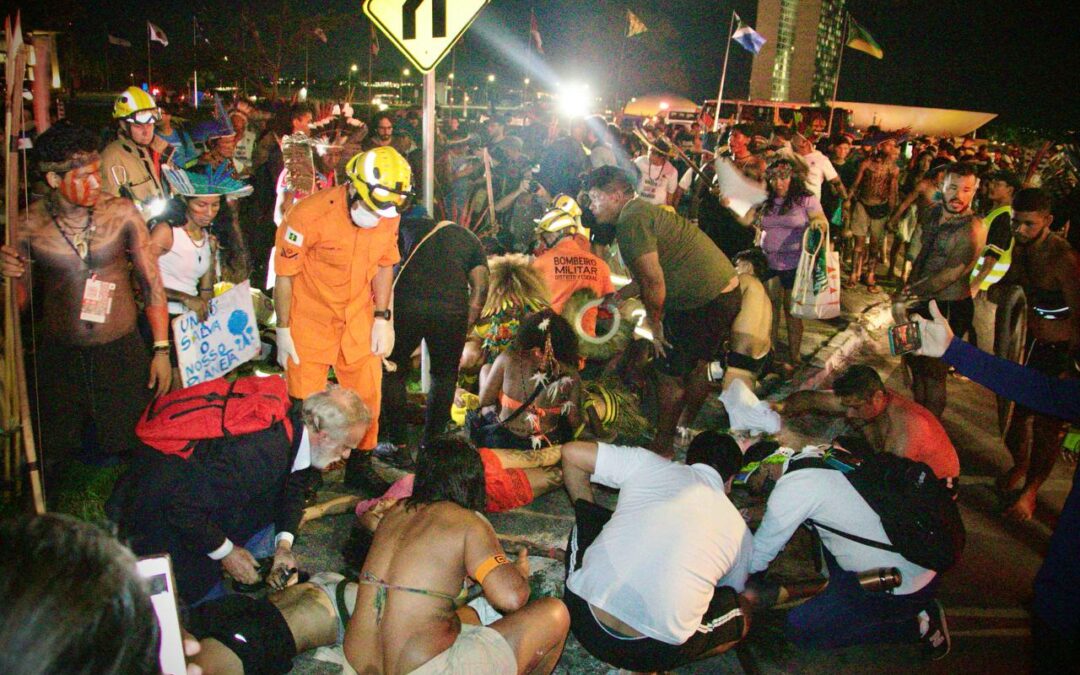
22/Apr/2025
Photo: Richard Wera/Apib
The Articulation of Indigenous Peoples of Brazil (APIB) vehemently condemns the acts of violence by the anti-Indigenous Congress, carried out by the Legislative Police Department (DPOL) and the Military Police of the Federal District (PMDF) on the afternoon of Thursday, April 10, during the “We Are the Response” march, which is part of the Free Land Camp (ATL) program.
In addition to approving unconstitutional laws, Congress attacks Indigenous Peoples and even its own deputies. Indigenous Congresswoman Célia Xakriabá (PSOL) and several others were injured when they were met with pepper spray and stun grenades — in what should be the house of democracy. We deeply regret the unnecessary use of chemical substances against demonstrators, including women, elders, children, and traditional leaders.
We have evidence that these actions are part of a broader context of institutional violence against Indigenous Peoples. Yesterday, during a meeting convened by the Public Security Secretariat of the Federal District (SSP-DF) to discuss the organization of today’s march, an unidentified participant made a racist and violence-inciting statement: “Let them come down already… let them come down and beat them if they cause trouble.” As recorded in audio obtained by APIB upon request after the meeting, the statement was allegedly made by a probable security force agent.
Today, access to the lawn of the National Congress by the demonstrators happened spontaneously and without any violence, vandalism, or breach of barriers. APIB reaffirms the peaceful and democratic nature of the protest, which brought together over 7,000 Indigenous leaders from various peoples across the country.
The mobilization aimed to defend constitutional rights and strengthen dialogue with the branches of the Republic. The Free Land Camp has been held for over 20 years in the federal capital, always marked by strong organization, commitment, and respect for democratic institutions. Throughout these two decades, the Indigenous movement has always cooperated and will continue to do so to ensure the event takes place peacefully and safely.
Free Land Camp 2025
Articulation of Indigenous Peoples of Brazil – APIB
Brasília, April 10, 2025
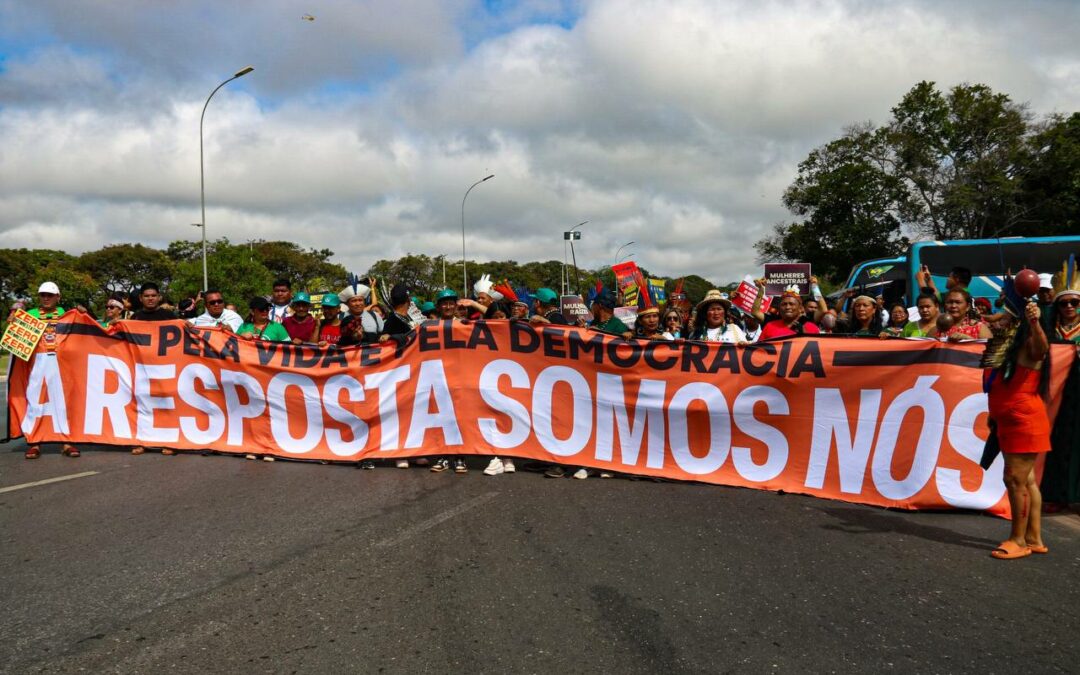
10/Apr/2025
Photo: _ @sallynhandewa
With the launch of an Indigenous NDC and the creation of an international commission, APIB strengthens the participation of Indigenous Peoples on the road to COP-30 in Belém.
The Articulation of Indigenous Peoples of Brazil (APIB) will launch today (April 10), at the Free Land Camp (ATL), an Indigenous Nationally Determined Contribution (NDC). In addition, the Ministry of Indigenous Peoples will announce an Indigenous International Commission for the United Nations Climate Change Conference (COP-30), which will take place in November in the city of Belém (Pará).
The NDC and the commission will be announced at the plenary “We Are the Answer: Indigenous Peoples on the Road to COP-30,” at the ATL, starting at 2 p.m., with the presence of Ambassador André Corrêa do Lago, president of COP-30. Ministers Sonia Guajajara, from the Ministry of Indigenous Peoples (MPI), and Marina Silva, from the Ministry of Environment and Climate Change (MMA), along with Federal Deputy Célia Xakriabá, who will also join the panel. These actions are part of the global campaign “We Are the Answer,” led by the Indigenous movement, which asserts that Indigenous Peoples and the demarcation of Indigenous Territories are essential in the fight against the climate crisis.
Developed from the accumulation of proposals by APIB’s regional organizations, the Indigenous NDC reinforces that the climate debate must consider equity, self-determination, and the effective participation of Indigenous Peoples and traditional communities in the implementation of Brazil’s NDC under the Paris Agreement.
The document is divided into six thematic axes:
- Mitigation, which defends the recognition and protection of territorial rights as essential climate mitigation policy;
- Adaptation, which highlights the importance of protecting ancestral knowledge, such as fire management and indigenous medicine;
- Financing, which proposes revising existing mechanisms and creating specific tools for the direct funding of indigenous organizations;
- Technology transfer, which suggests integrating traditional knowledge with modern science in climate strategies;
- Capacity-building, focused on technical training and access to climate information in accessible language;
- Justice and ambition, which recognizes the historical debt owed to indigenous and traditional peoples;
- Co-benefits, which links land demarcation to climate action, strengthening Brazil’s international commitments.
“The document is based on climate justice, the right to free, prior and informed consent, and the importance of solutions that respect nature and are conceived and led by Indigenous Peoples,” says Dinamam Tuxá, executive coordinator of APIB.
Commission for the Conference of the Parties
With the mission of amplifying the visibility and influence of Indigenous Peoples in climate negotiations, the Indigenous International Commission for COP-30 will be chaired by Minister Sonia Guajajara and will include the following organizations: APIB, COIAB, ANMIGA, the G9 of the Amazon, the Global Alliance of Territorial Communities (GATC), and the United Nations Permanent Forum on Indigenous Issues (UNPFII). There is also dialogue to include other international Indigenous organizations and forums.
“The commission is a platform that seeks to advance Indigenous rights, resilience, and climate leadership. At COP-30, we have the opportunity to ensure the best and largest indigenous participation in history. Our goal is to have one thousand accredited Indigenous representatives in the Blue Zone,” says Minister Guajajara.
The commission’s responsibilities include developing a methodology to guarantee Indigenous Peoples’ accreditation for the Conference of the Parties as an institutionalized practice for future COPs; ensuring focus on the specific priorities of Indigenous Peoples; conducting regional meetings; and planning and implementing high-level events and meetings with state parties, UN agencies, and allies to amplify indigenous demands.
International Participation at ATL 2025
The 21st edition of the Free Land Camp is marked by the participation of international indigenous delegations. Indigenous representatives from more than 15 countries are participating, including from the eight Amazon Basin countries, Australia, and Fiji, as well as leaders from the Global Alliance of Territorial Communities (GATC), which represents Indigenous Peoples and local communities from 24 countries.
According to APIB, the organizations participating in the mobilization include: Interethnic Association for the Development of the Peruvian Rainforest (AIDESEP), Amerindian Peoples Association (APA – Guyana), Confederation of Indigenous Nationalities of the Ecuadorian Amazon (CONFENIAE), Confederation of Indigenous Peoples of Bolivia (CIDOB), Federation of Indigenous Organizations of French Guiana (FOAG), Organization of Indigenous Peoples of Suriname (OIS), National Organization of Indigenous Peoples of the Colombian Amazon (OPIAC), Regional Organization of Indigenous Peoples of the Amazon (ORPIA), and the Global Alliance of Territorial Communities.
On April 10, the delegations will participate in the “Meeting with Embassies: We Are the Answer – Indigenous Peoples’ Visions for COP-30,” with the aim of bringing Indigenous demands to the embassies of Germany, Austria, Australia, Canada, Denmark, Spain, France, Finland, Ireland, Norway, the Netherlands, Peru, the United Kingdom, Sweden, Switzerland, and the European Union. Also participating will be the Ministry of Indigenous Peoples, Ministry of Environment and Climate Change, Ministry of Foreign Affairs, and the German Agency for International Cooperation (GIZ).
ATL 2025 brings together over 7,000 Indigenous participants at the National Arts Foundation (Funarte) in Brasília. Under the motto “We Are the Answer,” on April 10 at 4 p.m., Indigenous Peoples will march through the streets of the federal capital to the Plaza of the Three Powers.

05/Apr/2025
The largest indigenous mobilization in Brazil will be held between April 7 and 11 in Brasília (DF)
On the National Day of Struggle of Indigenous Peoples, February 7, the Articulation of Indigenous Peoples of Brazil (APIB) reveals the theme chosen for the Acampamento Terra Livre (ATL) 2025. “APIB is all of us: In defense of the Constitution and life” reinforces the commitment of more than 300 Indigenous Peoples to guarantee their rights provided for in the Federal Constitution, enacted in 1988. The theme also celebrates the unity and resistance of the indigenous movement represented by APIB, which, this year, completes 20 years of struggle and achievements.
The 21st edition of ATL, considered the largest indigenous mobilization in the country, will take place between April 7 and 11 in Brasília (DF). The location and schedule of the camp will be announced soon.
Dinamam Tuxá, executive coordinator of APIB, warns that fundamental indigenous rights — such as the demarcation of ancestral territories and the exclusive use of Indigenous Lands, all guaranteed by the Constitution — are under threat. According to him, this situation is a consequence of the constant attacks on Indigenous Peoples by public agents and the lobby of rural businessmen, which resulted in legislation and proposals such as the Indigenous Genocide Law (Law 14.701/23) and PEC 48, both related to the temporal framework thesis.
“It is necessary to demarcate and protect indigenous lands. We, Indigenous Peoples, have fought hard to ensure that the constitutional text is followed. To achieve this, it is important that indigenous rights are guaranteed and implemented, that institutions are respected and that the indigenous movement is heard. Only then will we have an even stronger Brazilian democracy!”, says Dinamam.
The Free Land Camp is organized by the Articulation of Indigenous Peoples of Brazil (APIB) and its seven regional grassroots organizations, namely: Apoinme, ArpinSudeste, ArpinSul, Aty Guasu, Conselho Terena, Coaib and Comissão Guarani Yvyrupa. Last year, the camp brought together around 9,000 indigenous people and more than 200 peoples in the federal capital, who debated and marched against the legislation known as the “Time limit trick” for five days. The legal thesis argues that Indigenous Peoples only have the right to demarcate their traditional lands if they were occupying these lands on October 5, 1988, the date of publication of the Federal Constitution of Brazil. disregarding the history of violence faced by Indigenous Peoples.
Read here the final mobilization letter.
The answer is us
For APIB, the 21st edition of the mobilization is also a strategic moment to discuss the “The Answer Is Us” campaign and indigenous participation in the Conference of the Parties (COP-30), which will take place in November in Belém (PA). Launched during the G20 Summit in Rio de Janeiro, the campaign highlights the need for decisive actions against the climate crisis, such as the end of the fossil fuel era, a fair energy transition and the recognition of the climate authority of Indigenous Peoples and their territories in protecting life on Earth. Check out the full indigenous call on the campaign’s official website: www.arespostasomosnos.org
On November 16, 2024, the Articulation held a peaceful demonstration in the capital of Rio de Janeiro to denounce the lack of action by the world’s richest and most polluting nations in confronting the global climate crisis. The images of leaders of rich and polluting countries – China, the United States, India, the European Union, Russia and Japan – were placed in the water, in front of Sugarloaf Mountain, to show that the climate crisis is also a crisis of leadership and values.
According to a study by APIB, Indigenous Lands under study or demarcated have a higher deforestation rate (0.2% per year) than those already regularized (0.05%). The data, part of the research “Demarcation is Mitigation”, reinforces the importance of demarcation in the fight against climate change. The study, conducted in partnership with IPAM and CIMC, was launched at COP-29, in Azerbaijan.
Learn more at: https://apiboficial.org/2024/11/15/terras-indigenas-nao-homologadas-sofrem-mais-com-desmatamento-em-comparacao-com-areas-ja-regularizadas-aponta-estudo-da-apib-ipam-e-cimc-lancado-na-cop-29-no-azerbaijao/
26/Oct/2024
We, Indigenous peoples of Brazil, in light of the severity of the biodiversity and climate crises, know that there is no time to waste.
Here, at COP-16 in Cali, Colombia, we want to declare that we will no longer accept any predatory projects that threaten our lives, our territories, and humanity. We will not accept any more oil and gas projects or any other form of predatory exploitation in the Brazilian Amazon, in our territories, and in our ecosystems. There will be no preservation of biodiversity and safe indigenous territories on a planet that is on fire.
We know who is setting the world on fire and the violent impact this has produced in our territories: severe droughts, forced isolation, diseases, lack of food, invasions, conflicts, and deaths.
In the face of the imminent collapse of the sustenance of life on the planet, strong and effective actions must be taken. While governments continue to seek to mediate insufficient targets and empty funding, we want to announce that, from now on, there will only be peace with Nature if we openly declare war against fossil fuels and any other predatory project that threatens life on the planet.
The Colombian government has already taken the first step by suspending the granting of new oil and gas explorations in the country and has already recognized us as environmental authorities. We hope that other countries will follow this same commitment. The other face of the climate and biodiversity crisis is the crisis of leadership and values. We have never abdicated this place and will not get lost in empty discussions and sterile commitments.
We demand the immediate resumption of the demarcation of all Indigenous lands in Brazil as an effective climate policy and direct funding for the comprehensive protection of our territories and our ways of life in harmony with Nature.
COP-30 will be in our territory. We will not accept that discussions take place without proper consultation and participation of our voices and authorities. We demand the co-presidency of the Climate COP in Brazil so that the accumulation of our ancestral knowledge and experiences can offer the world the opportunity for a different future.
We call upon all Indigenous peoples, partners, allies, and everyone who cares about life on Earth to join our call to collectively hold up the sky. If it depends on us, the sky will not fall.
WE HAVE ALWAYS BEEN HERE.
The sky’s rising begins now.
WE ARE THE ANSWER
Articulation of Indigenous Peoples of Brazil (APIB)
Coordination of Indigenous Organizations of the Brazilian Amazon (COIAB)
Articulation of Indigenous Peoples of the Northeast, Minas Gerais, and Espírito Santo (APOINME)
Council of the Terena People
Great Assembly of the Guarani People (ATY GUASU)
Guarani Yvyrupa Commission (CGY)
Articulation of Indigenous Peoples of the Southeast (ARPINSUDESTE)
Articulation of Indigenous Peoples of the Southern Region (ARPINSUL)
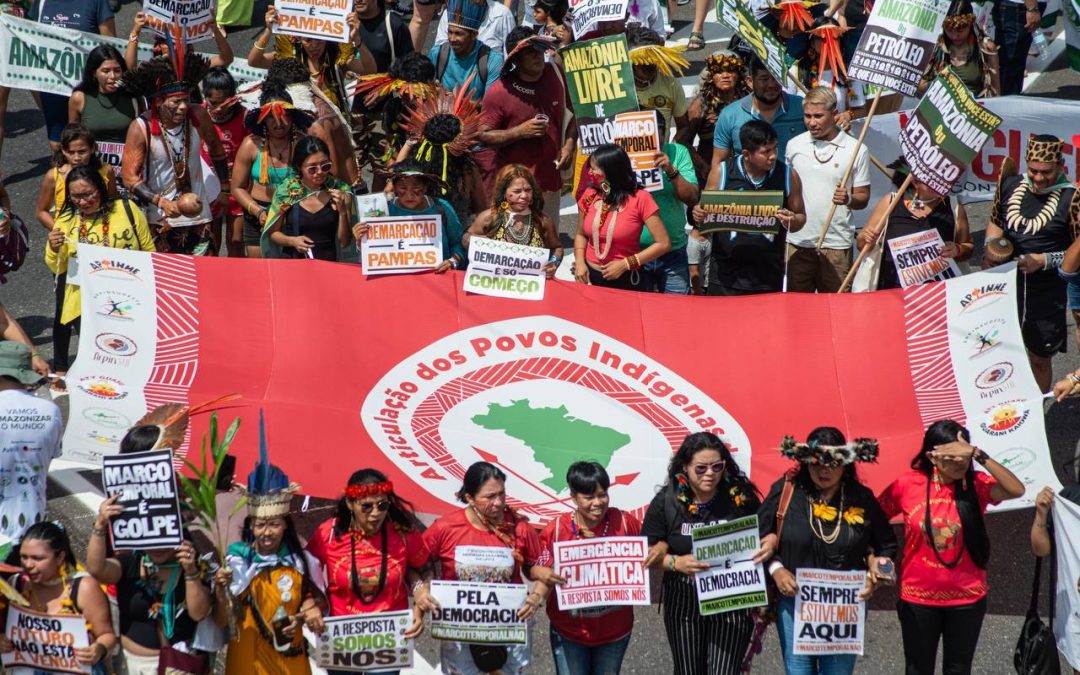
10/Aug/2023
The organization highlights the need for Amazonian countries to have defined actions involving the demarcation of indigenous lands, titling of quilombola territories and the creation of protected areas.
The eight presidents of the member states of the Amazon Cooperation Treaty Organization (ACTO) signed last Tuesday, August 8th, the Letter of Belém . The Letter is the main document of the Amazon Summit, which ends this Wednesday (09/08), in the capital of Pará. The Articulação of the Indigenous Peoples of Brazil (Apib), a national organization of reference of the indigenous movement, considers the Letter of Belém frustrating and demands concrete goals for the demarcation of indigenous lands.
“The document should be more ambitious. We understand there is a diversity of perspectives involving eight countries, and we recognize that political commitments were made, but the absence of specific and objective goals related to indigenous peoples and the environment is frustrating”, says Kleber Karipuna, executive coordinator of Apib.
Among the demands, Apib highlights the need for the Governments to define actions to address the point of no return in the Amazon (a term used by specialists to refer to the point at which the forest loses its ability to regenerate itself), which involves the demarcation of indigenous lands, titling of quilombola territories and the creation of protected areas. In addition to the monitoring and protection of territories and policies to support the sustainable use of those territories.
The indigenous movement also considers as disappointing the suspension of the announcement of demarcation of two indigenous lands during the Amazon Summit, as reported in the newspaper Folha de São Paulo . According to the report, the territories to be demarcated would be the Rio Gregório Indigenous territory, in Tarauacá (AC), and Acapuri de Cima, in Fonte Boa (AM). They are part of a list of 13 indigenous lands that are ready to be homologated , which was presented by the working group of Indigenous Peoples of the Transitional Government, of which Apib was part.
“The Government included the homologation of these 13 territories as part of the goals of the first 100 days of government. This goal was not met and, for the Summit, there was an expectation that other territories would be announced. The delay in this process has concrete Impacts on the indigenous peoples who are dealing with violence on a daily basis ”, emphasizes Dinamam Tuxá, who is also the executive coordinator of Apib.
Assembly of the Peoples of the Earth for the Amazon
Indigenous leaders from Apib and the Coordination of Indigenous Organizations of the Brazilian Amazon (Coiab) were in Belém for the Assembly of Peoples of the Earth for the Amazon , held between August 4th and 8th.
The Assembly was part of the political efforts of the indigenous movement to influence the IV Meeting of Presidents of the Signatory States of the Amazon Cooperation Treaty Organization (ACTO), Amazon Dialogues and the Amazon Summit.
During the Assembly, protection policies for isolated peoples were discussed, threats of exploitation by large mining companies and the oil industry, demarcation of ancestral territories, in addition to the resumption of the “time frame” case in the Federal Supreme Court (STF) (This would deny the claims of Indigenous communities to their territories if the communities cannot show that they were present on their lands when the 1988 Constitution was enacted).
On August 7, indigenous organizations in the Amazon published a document, “Letter from the Indigenous Peoples of the Amazon Basin to Presidents” . Delivered to the Amazonian presidents, the letter highlights the importance of dialoguing with the Indigenous movement to stop and solve the global climate crisis.
“Without us, there will be no Amazon; and, without it, the world as we know it will no longer exist. Because we are the Amazon: its land and biodiversity are our body; its rivers flow in our veins. Our ancestors not only preserved it for millennia, but also helped to cultivate it”, says an excerpt from the document.
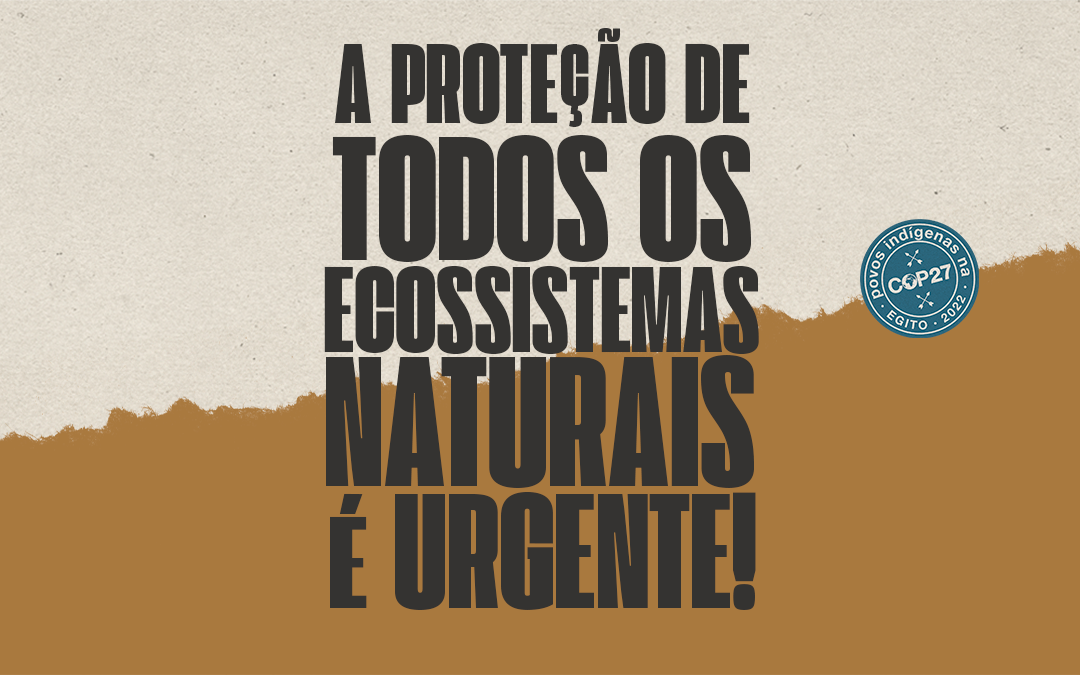
16/Nov/2022
We, from the Brazil’s Indigenous People Articulation (APIB) and the National Coordination of Articulation of Rural Black Quilombola Communities (CONAQ) emphasise our position in defence of all natural ecosystems in Brazil. It is extremely important that climate negotiations take into account not only forests, but also savannas, grasslands, wetlands and all the different expressions of nature around the world. These landscapes also contribute to the fight against climate change and are part of the solutions for a more sustainable, inclusive and socially just world.
We urge the European Union to take the necessary and urgent measures to prevent imported deforestation, as well as the land conversion of other native wooded lands. This is crucial in the Cerrado context, as most of the soy exported to the European Union is produced in this highly threatened biome.
The Cerrado is not a degraded landscape; it is the world’s richest savanna. It is home to hundreds of indigenous people, cultures and territories, as well as to communities of quilombolas, geraizeiros* and other traditional cultures and populations. It is also the largest agricultural frontier in the world, bearing the largest impact on soy imported by Europe. Monitoring tools are available to ensure the protection of the Cerrado – all we need is political will!
The same goes for all other natural ecosystems that are not forests: Pampas, Pantanal, Caatinga, as well as for the Atlantic Forest. If the European regulation against deforestation restricts itself to only protecting forests, it will have very limited impact – as almost 75% of the Cerrado would remain unprotected. The same would happen to 76% of the Pantanal and of the Pampas and almost 90% of the Caatinga. Moreover, the European regulation would have a perverse effect, as it would intensify the pressure of destruction on these ecosystems and on its people.
Ultimately, by being restricted to forests, the European regulation against deforestation would have the opposite effect of its original objective. This is why this law must also include “native other wooded lands” (primary savannas), rather than being restricted to native forests only.
This would increase the Cerrado protection from 26% to 82%, Pantanal protection from 24% to 42% and of the Caatinga from 11% to 93%. The Brazilian Cerrado is losing nearly a million hectares each year, and this destruction is increasing. An eventual revision of the law to be discussed in 2 years will not prevent the loss of millions of hectares of valuable ecosystems, the emission of millions of tons of carbon, nor violent attacks on hundreds of traditional people and territories. Therefore, we reiterate our claim:
THE EUROPEAN LEGISLATION ON DEFORESTATION MUST ENSURE THE RESPECT OF THE HUMAN RIGHTS OF ALL INDIGENOUS, QUILOMBOLA AND TRADITIONAL PEOPLE, AND PROTECT THE ENTIRE CERRADO NOW, BY INCLUDING NATIVE AND PRIMARY “OTHER WOODED LANDS” IN THE SCOPE OF THE LAW TEXT TO BE APPROVED THIS YEAR.
For technical details on this topic, refer to the following documents:
Egypt, Sharm el Sheikh, 15 November 2022
ARTICULATION OF THE INDIGENOUS PEOPLES OF BRAZIL – APIB
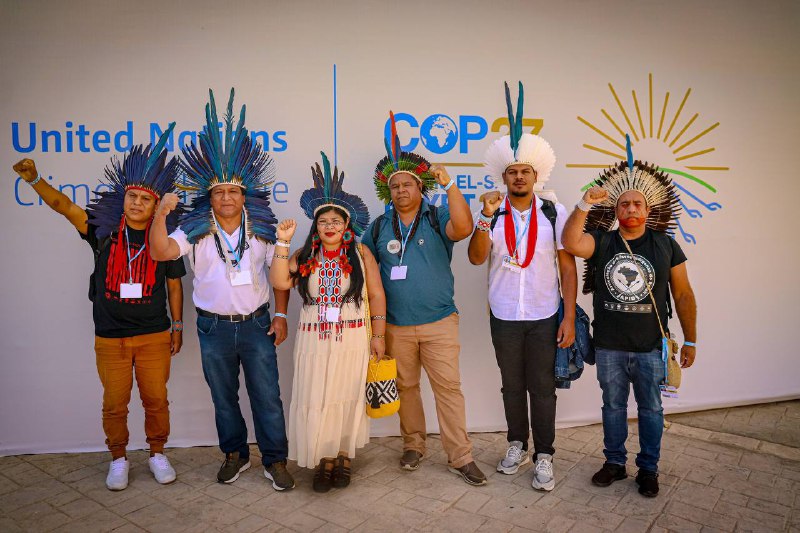
14/Nov/2022
Apib note to the new Lula Government and the world
The Articulation of the Indigenous Peoples of Brazil (Apib), together with its grassroots organisations, is present at the 27th UN Conference on Climate Change to reaffirm what needs to be done to tackle the global climate crisis: RECOGNIZE AND GUARANTEE LAND TENURE RIGHTS OF OUR INDIGENOUS LANDS!
We are in Egypt with an Indigenous delegation composed of women, men and young people who live in all 6 ecosystems in Brazil. We occupy this space because we know that for our Lands and Lives to be protected, it is still necessary to demarcate the minds of humanity. Government representatives, activists, leaders of human rights and socio-environmental organisations need to understand and support indigenous peoples in this ancestral mission of protecting our MOTHER EARTH.
For the whole world, this is the COP that marks the return of Brazil to the discussion and agendas on climate change, human and socio-environmental rights, after the last four years of a genocidal and ecocidal misgovernment. President Lula’s election victory, supported by Apib and all its organisations, marks a new moment for Brazil on the national and international scale.
Without our territories, greenhouse gas emission rates would be even more drastic. In 2021 alone, Brazil recorded the highest increase in the dumping of CO2 into the atmosphere in the last 19 years. A total of 2.42 billion tons of these pollutants were dumped.
On the international scenario, the European Parliament is in the process of approving the anti-deforestation law (FERC) and needs to ensure traceability of commodities beyond forests. Demanding that commodities producing companies respect the preservation of our biodiversity and the rights of indigenous peoples is crucial at this time. EU law needs to demand traceability of commodities from all native and primary vegetation. Only then the consumer markets will be taking action for a chain free of deforestation and indigenous blood. The Cerrado, Caatinga, Pampa and Pantanal also need to be framed in the Law’s concept of vegetation, in addition to forests like Amazon and Atlantic Rainforest, regardless of the UN Food and Agriculture Organization’s (FAO) definition of forests.
Of the promise made by countries and philanthropic institutions at the last COP26, in 2021, to guarantee 1.7 billion for indigenous peoples and local communities, only 19% was applied. Of this amount, only 7% was allocated directly to indigenous peoples’ organisations, according to a report by the group of funders of this proposal. In other words, for another year, indigenous peoples continue being directly impacted by the climate crisis, but without direct access to financial mechanisms to strengthen their actions to fight it.
Faced with this scenario, we, the indigenous movement, represented by Apib, reinforce to president Lula and his entire transition team that
- The demarcation of the Indigenous Lands be placed as a central agenda in the fight against climate change by the Lula Government;
- The five Indigenous Lands, which have been fully demarcated and are only awaiting the homologation decree, be signed as an act of commitment with the indigenous peoples in the first days of the government;
- The Lula Government supports the inclusion of the Cerrado, Atlantic Rainforest, Caatinga, Pampa, Pantanal and Amazon biomes in the Anti-Deforestation Law of the Parliament;
- Commitment to ZERO deforestation;
- Response on the request made by Apib to the Transition Government to include the participation of indigenous leaders in the space of construction of the transition process for rediscussion on the indigenous agenda within the Government (Funai, Sesai…) and the recently created Ministry of Indigenous Peoples;
Egypt, Sharm el Sheikh, 14 November 2022
ARTICULATION OF THE INDIGENOUS PEOPLES OF BRAZIL – APIB
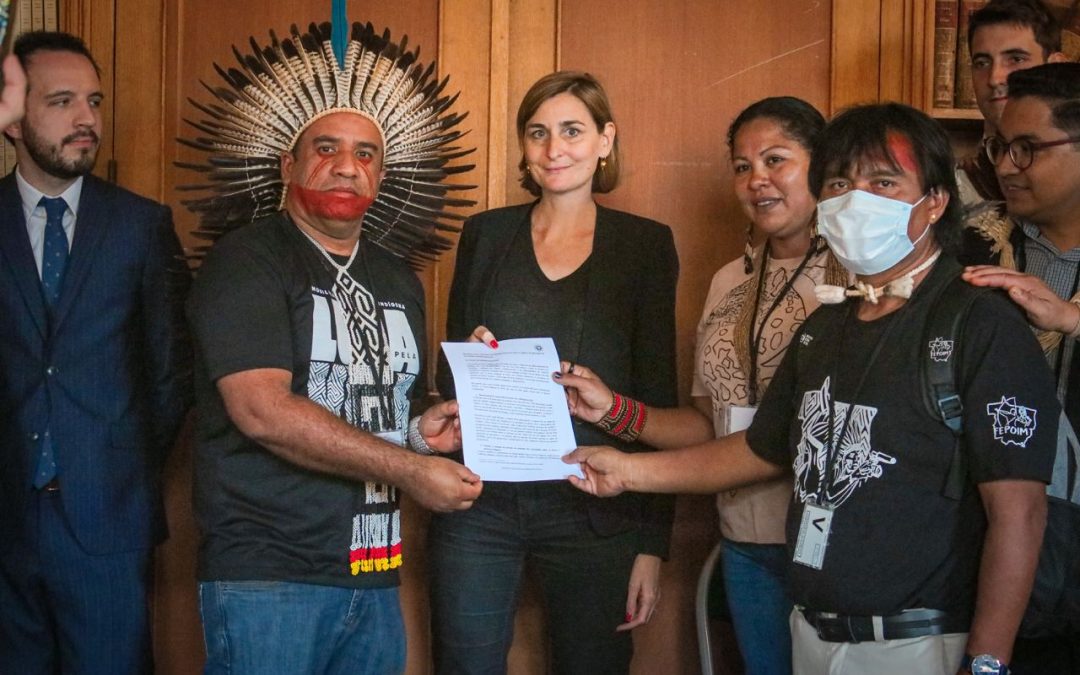
10/Jun/2022
To the Minister of Foreign Affairs
The Articulation of Indigenous Peoples of Brazil (APIB) is aware of the debate on the Law on the Importation of Forest-Risk Products (FERC) and hereby reinforces and calls on the Ministry to recognize the reality of the multidimensional impacts and responsibility of European economic and commercial dynamics on indigenous lands in Brazil. The law under debate is of paramount importance for the Indigenous Peoples of Brazil, as it directly influences the promoters of human rights violations, the demarcation of indigenous lands and the maintenance of the biodiversity that the Peoples of Brazil have been protecting and safeguarding for millennia.
To ensure that the new law has an effective and timely positive impact on climate change, the Indigenous Peoples of Brazil, through APIB, call for attention to the following considerations:
1. Territorial cut-off recognised according to FAO definition:
The current definition of forests within the draft law, according to FAO, disregards much of the Brazilian indigenous reality, since it ignores other biomes beyond the Amazon and the Atlantic Forest. The Indigenous Peoples have been facing genocide and the disappearance of their peoples and lands for more than 500 years throughout the national territory, in such a way that it is necessary to recognise the historic struggle for the maintenance of the forests, and other natural vegetation existing in Brazil.
If the current definition were taken into account, the bill would apply to only 15% of the Pantanal region, one of the biomes most affected by fires in recent years, and completely disregards the Pampas biome in the south of the country, where historical processes of invasion and occupation of indigenous lands are taking place, mainly caused by the advance of soy and cattle breeding. The Cerrado biome, responsible for safeguarding Brazil’s aquifer reserves, would have only ¼ of its area recognised as forest within FAO’s definition, being today one of the regions with significant advance of agribusiness and cattle breeding, besides the expansion of the agricultural frontier in the MATOPIBA region , which already brings impacts for soil and water contamination due to excessive use of pesticides.
2. Impacts and threats of commodity pressure on Indigenous peoples and territories.
Originally protectors and maintainers of biodiversity, today Indigenous Peoples suffer various forms of violence, threats and impacts on their lives, bodies and territories. The specific ways of life of Indigenous Peoples are intrinsically linked to the maintenance of biodiversity, natural resources and the continuity of life.
Indigenous Land is a guarantee of the future for all humanity. The relationship with territory is not one of ownership, exploitation, expropriation or appropriation, but one of respect and management of a common good, which serves all humanity. However, this fundamental portion for the survival of indigenous peoples and for the common good remains under constant threat. The pressure for deforestation in indigenous territories is intense, through invasions, mining, agricultural expansion and other illegal activities that occur within the territories, putting at risk the lives of the peoples who live there.
Violence and violations of constitutional rights are constant. The Peoples that defend and inhabit the forests face not only deforestation, fires and destruction of their biodiversity, but also live with extreme situations of violence, racism and expropriation of their original territories on a daily basis.
In addition to the impacts directly caused by the advancement of commodity production (agribusiness and livestock products), such as soil and river contamination by pesticides sprayed into the air, the invasion of indigenous lands for illegal production, deforestation and sale of illegal timber, Indigenous Peoples face direct attacks on their peoples, communities, families and bodies.
The persecution of leaders, and even their assassination, is an unfortunate reality experienced by the original peoples. Those who stand up for the defence of nature, biodiversity and the maintenance of global life are persecuted, criminalised, imprisoned and assassinated, with the complete omission of the Brazilian State. And unfortunately this persecution and violence extends to supporters of the struggle of indigenous peoples, as in the recent case of the disappearance of the indigenous activist Bruno Pereira and correspondent journalist of The Guardian, Don Philips, who were denouncing the attacks suffered by indigenous peoples in the Vale do Javari region – the second largest indigenous land in Brazil (an area almost the size of Portugal).
The invasion of land, for the illegal production of commodities, leads to direct confrontation with the original communities, exponentially increases situations of gender-based violence and abuse of minors, as well as implanting dynamics of alcohol and drug abuse through the massive arrival of invaders occupied with tree felling, mining, and cattle production.
Although constitutionally recognised since 1988, the demarcation of indigenous lands has still not been concluded in Brazil. Indigenous lands that have not yet been ratified face strong pressure from economic dynamics, which take advantage of the omission of the Brazilian State to advance over areas protected by, and guaranteed for, the indigenous peoples. Currently, this gap makes these lands vulnerable not only to the production of commodities, but also opens the way for the presence of organised crime that operate drug trafficking as well as illegal logging. The presence of criminal factions also increases the pressure on indigenous youth, not infrequently enticing and recruiting young people for organised crime.
3. Brazil’s institutional weakness regarding the protection of indigenous lands.
Relying solely on national legislations and agencies does not provide security for Indigenous Peoples, who are currently witnessing the dismantling of public policies, regulations and protective institutions.
The Bolsonaro government was responsible for the destructuring of the policy of protection and monitoring of indigenous lands, from the extinction of public resources for protection agencies to the persecution and dismissal of professionals historically committed to the indigenous agenda.
Relying on the structure of defence and protection of Indigenous Peoples that exists today in Brazil leaves serious gaps for the effectiveness of European law.
From 2010 to 2020, the area occupied by mining within indigenous lands grew 495%, according to data from Map Biomas. This represents a 41-fold increase in deforestation caused by a practice that is illegal and violent to indigenous peoples and that the Brazilian congress, pressured by President Jair Bolsonaro, intends to legalise via Bill 191/2020.
Besides this bill that intends to open the indigenous areas to devastation of the forest and of lives, there is a whole package of destruction on the agenda of the National Congress that insists on the end of demarcations and the revision of Indigenous Lands (Bill 490/2007), that legalises the illegal occupation of public lands (Bill 510/2021), among others that make the legislative protection structure of indigenous territories and peoples more flexible.
Beyond the legislative threats, there is the president of Brazil himself, who has been fulfilling his role when he stated, while still campaigning in 2018, that he would not demarcate any millimetre of indigenous land. In his government, all demarcations are stalled and are at risk of being extinguished if the Temporal Framework Thesis (Marco Temporal) is judged in Brazil’s Supreme Court. The trial of the Temporal Framework is considered the trial of the century by indigenous peoples, as it defines the future of the demarcation of territories. If the Supreme Court decides in favour of this thesis, the right to territory and their protection may be extinguished. This bill is one of the main attacks by the Legislative Branch on the rights recognised to indigenous peoples in the CF/88. It is considered by APIB as an “attempt at genocide”. The main alteration of bill 490 would end up making the demarcation of indigenous lands unviable through the incorporation into law of the thesis of the temporal landmark, as one of the taxative requirements to be observed for the recognition of traditionally occupied areas. The trial, which began in 2021, was cancelled for its third time this year.
4. Climate emergency
There is no solution to the climate crisis without Indigenous Peoples.
Climate change is more perceived by indigenous peoples because we have an intimate relationship with Mother Nature: all our sustenance comes from her and she gives us all the explanations for the phenomena that affect our lives. We understand her language. Looking at the sky, feeling the temperature, listening to the beat of the earth are things we learn from an early age, through indigenous education, which prepares us to manage the world, brings meaning to life. But everywhere we have gone we have heard personal perceptions regarding the imbalance in the climate.
Even in large urban centres many people are already noticing its effects on their daily lives.
The transformations are beginning to awaken everyone’s instincts. The Articulation of Indigenous Peoples of Brazil (Apib) is reinforcing to the world the centrality of peoples and their territories in confronting the climate crisis. We are watching governments and organisations seeking technological solutions and tools that can help the current crisis, but it is necessary to understand that the main social technology has already been developed by indigenous peoples: traditional territories and indigenous cultures.
These spaces play a fundamental role in balancing climate, thus benefiting all of humanity. But for them to be preserved, the way of life of the indigenous peoples must also be preserved. With their own way of life, indigenous people guarantee this harmony and well-being beyond their lands.
The countries of the European Union, large buyers of commodities from Brazil, can help us protect our lives and our territories. Therefore, we are here in Europe and we demand strong and ambitious guidelines for FERC, such as: (1) ensuring that all biomes are included in the legislation; (2) that the inclusion of respect for the international rights of Indigenous Peoples is maintained, due to the fragility of national legislation and (3) that this law is brought to a vote as soon as possible in the European Parliament, because with each period of delay, the destruction of our lives and territories is accelerated
The approval of FERC, with strong and ambitious guidelines for the protection of our rights and biomes is urgent, so that a message is sent to the Brazilian government and to those who benefit from the attacks on Indigenous Peoples: Europe will no longer connive with violence against Indigenous Peoples. To guarantee their rights is to guarantee the life of humanity.
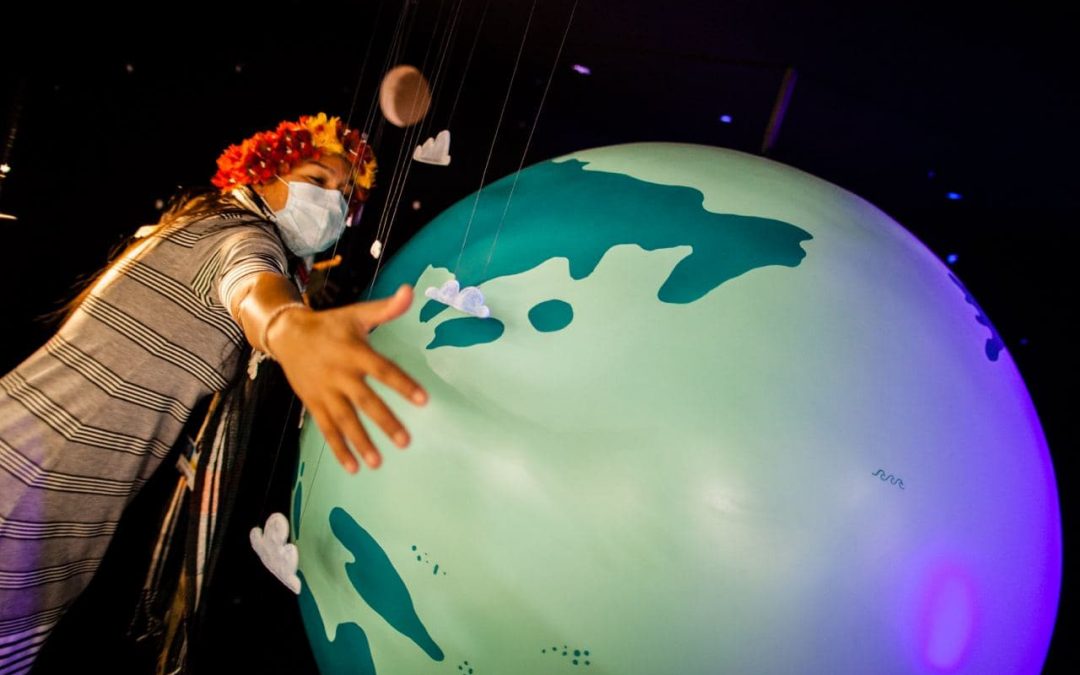
02/Nov/2021
The Global Alliance of Territorial Communities issues a statement calling for a stronger commitment to land tenure as a key climate solution .
Declaration issued by: the Coordinator of Indigenous Organizations of the Amazon River Basin (COICA) and its member organizations from the nine countries of the Amazon basin; the Mesoamerican Alliance of Peoples and Forests (AMPB) and its member organizations from six Mesoamerican countries; the Articulation of Indigenous Peoples of Brazil (APIB); the Network of Indigenous Peoples and Local Communities for the Sustainable Management of Forest Ecosystems (REPALEF) in the Democratic Republic of the Congo; and the Alliance of Indigenous Peoples of the Archipelago (AMAN), which represents 17 million Indigenous Peoples throughout Indonesi
As an organization that represents Indigenous Peoples and local communities in 24 tropical forest countries, the pledge made at this World Leaders Summit to allocate $19.2 billion to support the recognition of land rights for Indigenous peoples and local communities is good news–and we are pleased by it. In making this commitment, major public and private funders acknowledge the critical role that we play in the fight against climate change and underscore the urgent priority that should be securing tenure over our lands.
However, we cannot receive this news with enthusiasm because we were not consulted in the design of this pledge. We suspect that many of these funds will be distributed through existing climate finance mechanisms, which have demonstrated great limitations in reaching our territories and supporting our initiatives. Furthermore, millions of dollars have already been invested to protect forests and halt deforestation, but have yielded minimal results. This is because governments are not present in these territories, which limits their capacity to implement long-term policies that protect natural resources.
Of the total funding committed to reduce deforestation, only a small fraction is likely to reach Indigenous Peoples organizations and local communities, as most of the funding flows through large intermediaries with excessive bureaucracy. Our suspicions are confirmed by the fact that practically none of these announcements have been previously consulted with us or our member organizations.
Nevertheless, we also have good news to contribute. Given that public and private donors, as well as philanthropies, have difficulty delivering funds at the community level, we have developed a series of recommendations to facilitate this process. These recommendations make up a new vision, the Shandia Vision: a financing ecosystem that will finally allow financial support to reach our territories.
As the Global Alliance of Territorial Communities, we commit to holding governments and investors accountable for the financial promises they made today, within the framework of our Shandia Vision, and we invite international cooperation to build a new mechanism for delivering climate finance. One that can truly reach the territories where the preservation of biodiversity and carbon stock is at stake.
“We protect most of the world’s remaining biodiversity, yet we receive less than one percent of international donor funding,” said Joseph Itongwa Mukumu, an Indigenous Walikale from the Democratic Republic of Congo who serves as coordinator for the Network of Indigenous Peoples and Local Communities for the Sustainable Management of Forest Ecosystems (REPALEF). “If it is serious about ensuring that the forests remain standing, the global community must do more to recognize the rights of Indigenous peoples and to support our traditional governance structures.”
“We propose a new way of investing resources directly into our communities, who are on the frontlines of climate change and risk our lives to protect nature. Transforming the way climate finance is delivered locally would ensure a greater impact for the good of all humanity,” said Tuntiak Katan, an indigenous leader from Ecuador, and head of the Global Alliance.
Forests managed by Indigenous peoples and local communities have lower deforestation rates than similar lands managed by others. Between 2000 and 2012, for example, the average annual deforestation rates in our forests in Bolivia, Brazil, and Colombia were two to three times lower than those not managed by Indigenous peoples. But those gains come only when our communities have secure rights over their land, which is why funding such initiatives must be of paramount importance.
In addition to the recognition and protection of our communal land rights and customary tenure systems, we demand compensation for the range of ecosystem services—including protection from emerging pandemics—generated from our lands. We demand that investment decisions be determined from within our communities and that our elected leaders and traditional ways of life be respected in all decision-making arenas. And we request direct financing to support our efforts to sustainably manage our land and resources, with tools for monitoring and protecting it from intruders such as agribusiness and illegal miners and loggers.
“The commitment announced today to halt forest loss and protect Indigenous Peoples’ rights is long overdue,” said Mina Setra, an indigenous leader from Indonesia, and the Deputy Secretary General of the Indigenous People’s Alliance of the Archipelago (AMAN). “We applaud the governments and donors involved for taking this step to protect our rights and the global climate. However, this pledge must not replace the fundamental actions they must take to stop their companies’ from bulldozing our ancestral forests. To fulfill their mission and avoid a climate catastrophe, they must stop all deforestation on the lands of Indigenous Peoples and Local communities and work with us to protect the world’s last remaining tropical forests.”
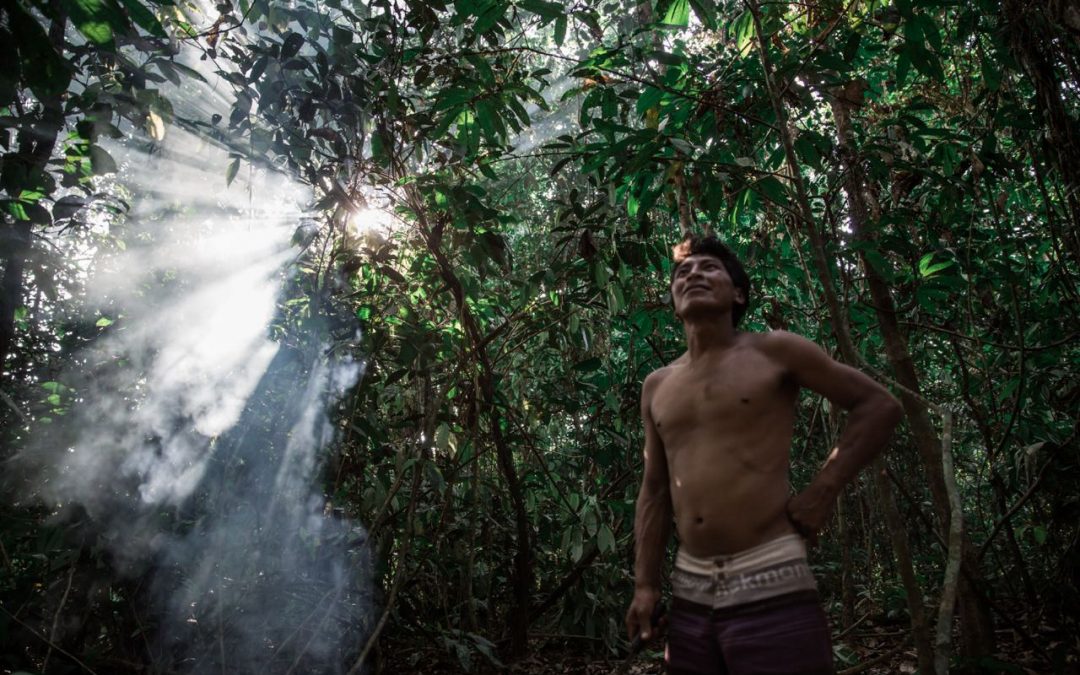
29/Oct/2021
We, Indigenous Peoples of the Brazilian Amazon, have long observed climate change and its effects due to our relationship with the Mother Earth. From her, we receive all our sustenance needs in addition to the explanations for the phenomena that affects the lives of all living and cosmological beings.
In Brazil, climate crisis is directly related to the greed over Indigenous lands and the natural resources therein, coupled with the ongoing regression and rollback of Indigenous and environmental safeguards and rights. It is essential to think seriously about the need to respect the socio-biodiversity present in our territories, especially at this time that we are living in, in which a virus stopped the world and affected the routines of billions of people from all social classes and different cultures. However, the current government in Brazil is acting in lethal ways with anti-environment, anti-climate, and anti-Indigenous policies. Our territories, which belong to us by our Constitutional right, are being invaded by illegal miners and loggers; villages are surrounded by large-scale cattle and soybean farms; rivers are being contaminated with pesticides and mercury; and the Amazon rainforest is burning to ashes. Yet, governments and funds that operate internationally continue to finance this unbridled greed, this economy of destruction that kills and destroys lives and the planet.
Now more than ever, everyone needs to hear our call, that we Indigenous Peoples have been warning for centuries based on our traditional knowledge that guides our way of seeing and understanding the world. It is in this context that we once again call attention to the need to construct a climate justice that is inclusive and participatory with respect to our cosmologies, our safeguards, and our territories. It is necessary to go beyond the targets established in international agreements and begin to consider the vital role that we play in this process. All this in consideration of social and environmental responsibility.
We have now reached the tipping point. The recent report released by the Intergovernmental Panel on Climate Change, titled “Climate Change 2021: the Physical Science Basis,” clearly demonstrates that man-made changes to the climate are irrefutable, irreversible, and will worsen in the coming years and decades if we do not have practical actions to change the narrative of the climatic, environmental, and societal crisis. Likewise, even if we zeroed greenhouse gas emissions, we would already have had a significant increase in global temperatures with catastrophic effects.
There is no other way forward but to recognize, strengthen, and promote the very important role played by us, Indigenous Peoples, within our territories. For us, talking about climate justice is precisely thinking about the fate of the present and future generations, as well as those who have chosen different forms of social structures like the Indigenous Peoples in isolation or recent contact who live in the Amazon. This is related to the need of respecting diversity. Indigenous cosmology makes us understand the signs of Mother Earth, imposing the duty to recognize ecocide. The rivers, lakes, animals, forests, and all cosmological beings that live within are subjects of rights just like us human beings, and their rights must be respected. Therefore, when talking about climate crisis, it requires recognizing the important role of Indigenous lands, and our own, who give our lives to protect the forests and its biodiversity, in balancing the climate and benefiting all Humanity.
Yet, there exists a practical solution that we Indigenous Peoples have been pointing out. That is, demarcating our territories, shifting the production system, planting more trees, ending reliance on fossil fuels, and reducing the pressure on the Earth’s natural resources. This must be a commitment from everyone, including governments, the private sector, and individual people.
Protected territories and respected rights are the solution. We cannot let ourselves be seduced by the idea of carbon markets, false solutions based only on nature and financing mechanisms that is not consistent with our reality. Rather, we offer alternatives based on our traditional knowledge, which can be associated with technological innovations. For example, agricultural practices must be linked to food security. Therefore, we call attention to the joint responsibility of all stakeholders involved. Corporations and governments are responsible for the destruction in the Brazilian Amazon; however, criticism alone is not enough. Now more than ever, much more is needed to adopt measures to safeguard ecological interests.
It is urgent and essential to strengthen Indigenous funds and financing mechanisms that correspond to our reality,as the Brazilian Amazon Indigenous Fund – Podaali. Such resources should promote the implementation of Indigenous Peoples’ life plans in addition to socio-environmental policies. Nonetheless, none of these efforts will have an effect until all Indigenous lands are demarcated, 80% of the Amazon biome is protected, and all stakeholders have committed to ambitious and achievable goals. In this way, it becomes clear that it is necessary to change the entire current political and economic system.
The time has come for the Indigenous Peoples of the Brazilian Amazon, through the Coordination of the Indigenous Organizations of the Brazilian Amazon (COIAB) – which is the largest Indigenous organization in Brazil, representing approximately 480,000 Indigenous Peoples from 178 different groups and covering 23% of the Amazon region – to mobilize the world to ally with Indigenous Peoples in defense of life on Earth as we know it.
The struggle of Indigenous Peoples is a global one!
Brazilian Amazon, October 15, 2021









